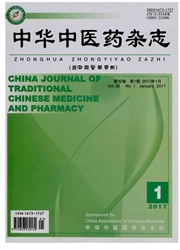

 中文摘要:
中文摘要:
目的:评价参黄散敷神阙穴在促进胃癌术后气滞血瘀型胃肠功能不全康复的有效性及安全性。方法:将本院外科2011年8月至2012年12月间收治的符合纳入标准的胃癌手术患者52例,随机双盲分为治疗组(参黄散敷脐组)和对照组(安慰剂敷脐组)。评价两组在术后恢复、平均住院天数、住院费用和中医证侯临床疗效的差异。结果:治疗组术后排气和排便时间、恢复进食时间、住院时间等均优于对照组,差异有统计学意义(P〈0.05);治疗组的中医证侯疗效总有效率为92.86%,与对照组66.67%比较,差异有统计学意义(P〈0.01)。两组住院费用未见明显差别。结论:参黄散敷神阙穴能促进胃癌术后气滞血瘀型胃肠功能不全的康复,增加患者舒适度,且安全可行。
 英文摘要:
英文摘要:
Objective: To evaluate the efficacy and safety of the Shenhuang Powder at Shenque (CV 8) in promoting early rehabilitation of gastrointestinal dysfunction after operation for gastric carcinoma in syndrome of qi stagnation and blood stasis. Methods: From August 2011 to December 2012, a randomized and double-blind study was conducted of 52 patients after gastric carcinoma operation accorded with the inclusion criteria, who were divided into a treatment group which was applied at umbilicus by Shenhuang Powder, and a control group by placebo. The difference of postoperative recovery, average length of stay, hospitalization expenses and clinical efficacy of TCM syndrome in two groups was evaluated. Results: The time of exhaust gas and stool after operation, the time to eat and the length of stay in the treatment group were superior to those in the control group (P〈0.05); The total effective rate of TCM syndrome efficacy in the treatment group was 92.86%, which had significant difference when compared with 66.67% in the control group (P〈0.01). There was insignificant difference in hospitalization expenses. Conclusion: Shenhuang Powder at Shenque (CV 8) could promote the rehabilitation of gastrointestinal dysfunction after operation for gastric carcinoma in syndrome of qi stagnation and blood stasis, for added comfort and safety.
 同期刊论文项目
同期刊论文项目
 同项目期刊论文
同项目期刊论文
 期刊信息
期刊信息
